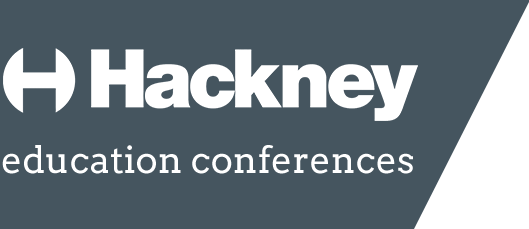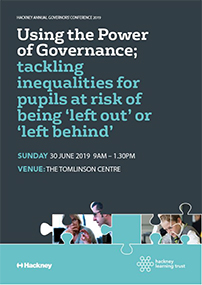
Using the power of governance
Tackling inequalities for pupils at risk of being ‘left out’ or ‘left behind’
The Tomlinson Centre, Queensbridge Road, E8 3ND
Sunday 30 June 2019, 9.30am – 1.30pm
£95+VAT per governor
Free to schools that purchase the Governors Training Package
Overview
This conference aims to look beneath high performance statistics that may be veneering the difficulties faced by our most vulnerable children. Drawing on learning emerging from the Hackney Young Black Men initiative, we aim to develop a better understanding of the scale of the issues. This will stimulate a broader critique of our education systems at a local level. It will also inform a deeper reflection of governance practises that impact on tackling inequality for those ‘left out’ or ‘left behind’.
There is a pressing need to design systems that will improve the educational experience and tap into the extraordinary gifts and talents of our most vulnerable pupils. For them, the duty of governance goes beyond the norm, to ensure every child’s education journey is supported in ways specific to their needs, whilst offering them equal and fair opportunities to their peers.
As such, we hope this event will call to action all who share the belief that a genuinely inclusive and personalised educational model is possible. It will influence how the power of governance can be used to challenge and support our schools. It will aim to cause disruption to the trajectory of those historically left out’ or ‘left behind’.
In doing so, we will ensure that our most vulnerable young people can also become the most accomplished and successful.
Programme
9.00 – Registration, networking and refreshments
9.30 – Welcome – Annie Gammon, Director of Education and Head of Hackney Learning Trust
9.35 – Conference introduction – Maggie Kalnins, Head of Governance Services
9.40 – Keynote panel debate – chaired by Jermain Jackman, musician and political activist
- Using the power of governance – tackling inequalities for pupils at risk of being ‘left out’ or ‘left behind’
10.40 – Break for networking and refreshments
11.00 – Seminars (see the seminars tab for further information)
- Why is a sense of belonging so crucial for every child and their family?
- Why should we be asking more questions about pupils at risk of being ‘left out’ or ‘left behind’?
- Why should we be looking again at our behaviour policy?
- Why is alternative provision the right pathway for some children?
- Why do we have a Hackney wide ‘Young Black Men’ initiative?
12.15 – Break
12.30 – Panel session – led by young people and inspiring leaders from Hackney community
- Sharing key messages arising from each seminar about how governors could use their powers
13.00 – Final reflections – Raymond Antrobus – ‘Poet, Teacher and Hackney Boy’
Raymond was born in Hackney to an English mother and Jamaican father, he is the author of ‘Shapes and Disfigurements’, ‘To Sweeten Bitter’ and ‘The Perseverance’. In 2019 he became the first ever poet to be awarded the Rathbone Folio Prize for best work of literature in any genre, taking the award for his “exceptionally brave and kind” exploration of the deaf experience, The Perseverance. In March, Raymond won the Ted Hughes award for poetry, when he was described by judges as a writer who is “passionate but speaking from his scars not his wounds – this is a poet you sense very deeply that you can trust”.
13.05 – Completion of evaluation and next steps – Maggie Kalnins, Head of Governance Services
13.10 – Close of conference
View the full programme
Keynote panel debate
Using the Power of Governance; Tackling inequalities for pupils at risk of being ‘left out’ or ‘left behind’
Chair: Jermain Jackman – musician and political activist
Jermain Jackman, born and raised in Hackney, combines his musical talent with pursuing his role as a political activist. He was crowned winner of BBC’s The Voice UK in 2014, tagged as being the ‘Singing Politician’ by Sir Tom Jones and referred to as Britain’s first singing black Prime Minister.
As the co-chair of Hackney Young Futures Commission, advisor for the National Citizens Service, and studying Social Science & Politics at University, Jermain is determined to use his voice as a tool for social change. He enacts change by going into youth clubs, schools and estates, not simply to talk to young people, but, crucially, to listen to what they have to say. He is concerned that too often young people’s voices are ignored. As such, Jermain is determined to raise awareness of youth feeling disenfranchised and without opportunities, as the first step towards finding and delivering solutions that address the complex issues they face.
As someone who was not afforded everything he wanted, Jermain recognises how much his family and community inspired him, and that it really does take a village to raise a child. “I have always wanted to change the world…No dream is too big and no role is too far”. My success my responsibility | Jermain Jackman | TEDxEastEnd
Shekeila Scarlett
Co-chairs Hackney’s Young Futures Commission with Jermain. She grew up in Hackney but could not get a place at a local secondary school. Aged 12, she faced permanent exclusion, which was overturned on appeal. Returning to school Shekeila became involved with Immediate Theatre, which changed her self-confidence, self-esteem and her life.
Ishaka Kalokoh
Grew up in South East London, an aspiring actor at the Guildhall School of Music and Drama. Growing up, Shaka faced many barriers in gaining access to acting and ultimately, having an alternative sense of direction.
Yazmin Belo
An aspiring actress and writer, who is passionate to support the community in tackling the challenges she faced in her youth.
Jonathan Senessie
Was permanently excluded from mainstream school. At the Boxing Academy, he found the support and education he needed after being written off so many times before. He features in the Channel 4 Uncovered “They don’t set out to be bad kids. They don’t set out to fail at education.”
Seminars
Delegates will be able to choose one seminar to attend. Please select your preferred seminar including your reserve choice. Seminars have limited spaces and will be allocated on a first come first served basis.
Seminar one – why is a sense of belonging so crucial for every child and their family?
Leaders: Harry Spencer and Patrick Middlesburg – New Wave Federation
This seminar will look through the social lens of pupils’ sense of belonging, starting with understanding the relationship between ‘school’ culture and ‘home’ culture and how these can converge successfully into a sense of individual identity.
Probing questions will include: How well do we get to know the pupils before we teach them? How well does our school culture and curriculum instil a sense of belonging for pupils most at risk? What does authentic parental engagement look like in our school? How well do our staff and governor profile / alumni / speakers and curriculum materials reflect and provide role models of the pupil community – particularly for those most at risk? What strategies do we use to support transitions, including inducting pupils and their parents/carers into the culture of our school – the rituals routines, the learning and behaviour expectations? How do we track how well they settle in? How do we ensure a two-way dialogue about belonging?
Seminar two – why should we be asking more questions about pupils at risk of being ‘left out’ or ‘left behind’?
Leader – Nick Corker – Hackney Learning Trust
This seminar will look through the lens of children who are in care, providing a clearer understanding of the complexity of the issues their context presents for their support structures, and strategies to address these complexities.
Probing questions will include: What would an effective early identification system to assess inequalities and risk factors look like? What should we be seeking to understand primarily? Which factors are considered to identify the range of needs and highlight those pupils most vulnerable of being ‘left out’ or ‘left behind’? How do we capture the pupils’ own voices, and that of their parents/carers, in order to understand their context, their issues, and their needs? How do we ensure support strategies align to needs as well as legal and procedural requirements? How do we build confidence and ensure communication across all staff and governors that supports a holistic approach to implementing and monitoring the effectiveness of strategies?
Seminar three – why should we be looking again at our behaviour policy?
Leader: Helena Burke – Hackney Learning Trust
This seminar will look through the lens of behaviour policies, focusing on how designing policies around schools system and operations which are sanctions based impacts on the most vulnerable pupils.
Probing questions will include: How do we negotiate the tension of an inclusive approach with zero tolerance of poor behaviours? How might behaviour policies need to change to address the wider support network that pupils have or need? What is the impact of policies which are embedded in the practice of forming relationships and empathy in supporting the development of children? What are the truths behind exclusion data? How can we work towards an inclusive behaviour management? How do we make fair decisions when faced with an exclusion?
Seminar four – why is alternative provision the right pathway for some children?
Leaders: Anna Cain – Boxing Academy
This seminar will look through the lens of Alternative Provision (AP), considering this option for young people who resist universal educational opportunities and find themselves marginalised from conventional schools.
Probing questions will include: What characterises pupils within in an AP setting? Does AP have more specialised expertise, capacity and flexibility to provide a bespoke provision? How can we tap into the extraordinary skills and talents mastered by those who become excluded from schools? How could AP and mainstream collaborate more closely? How could our education system as a whole live up to the promise of inclusivity and equity?
Seminar five – why do we have a Hackney wide ‘Young Black Men’ initiative?
Leaders: Orlene Badu – St Matthias Primary School, Anton Francic – Hackney Learning Trust, Solomon Rose Hackney Council
This seminar will look through the lens of Hackney’s Young Black Men initiative, a ten-year programme running since December 2015, to share learning from how schools are tackling disproportionality in attainment and exclusions. The aim is to ensure governors are informed from research findings and current practice, particularly in the area of cultural competence.
Probing questions will include: How are leaders, including governors, developing better ways to improve outcomes and life experiences of black young men and women? How could we use the racial identity models to address unconscious bias? How can the curriculum be developed to promote a strong sense of belonging and inclusivity for young black men? What are the tools and key questions governors could use to assess how well their school is promoting better outcomes for young black men?

